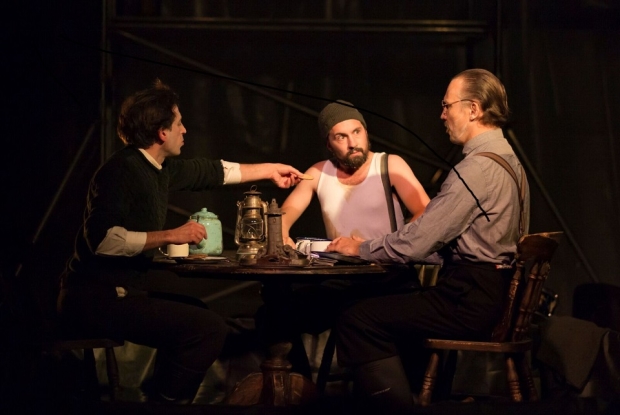Review: The Lighthouse (Hackney Showroom)

© Nick Rutter
"It smells of old sea graves, sea wrecks, sea deaths in here". While that’s not quite true of the antiseptic Hackney Showroom, a space where it’s hard to conjure the infinite briny even in designer Alex Berry‘s polythene environment, by the end of Shadwell Opera‘s production of The Lighthouse you’ll be fathoms below.
In December 1900 three lighthouse keepers vanished from their post. No one has ever discovered how or why, but it’s a mystery that Peter Maxwell Davies drew on 79 years later as the basis for this 70-minute chamber piece, a work that never ceases to amaze. The resourceful score, as it should, drives the story; the composer’s libretto merely stokes the boiler. It’s theatre that picks like a scab at the inner psyche of characters and explores their farthest limits in a way no spoken drama can hope to do. It is, in short, the perfect opera.
Benjamin Britten’s more ubiquitous ghost tale may turn the screw but it doesn’t twist the nerves as this one does. It’s tempting to think of The Lighthouse as the Woman in Black of opera, but it’s more insidious than that. Slow-burn chills make it, rather, a godparent to plays by Conor MacPherson like The Weir and The Seafarer.
In an extended prologue, three naval officers report on the discovery of a deserted lighthouse. Their respective accounts differ in small ways, a point whose significance only becomes clear later on; then, at the turn of a light (Daniel Spreadborough creates some eerie effects) the same three singers recede through time and become the lighthouse men themselves. They are now Sandy, Blazes and Arthur, names that evoke earth, fire and air, while the missing element, water, sloshes around their ankles in Jack Furness‘s vivid production.
'Storms, shocks and looming death'
Three robust voices take us to their characters’ hell in performances so committed that we forget they’re acting, even singing. The deep eyes of tenor Paul Curievici are gates of harrowed darkness to his soul; the impatient countenance of Owain Browne becomes tainted by the devil when he sings a swaggering song about his abused and abusive youth, and Pauls Putnins excels as an abrasive God-botherer whose religious certainties rise in major intervals from the boots of his bass to the heights of falsetto.
Maxwell Davies uses shuddering dissonance to create tension and visceral dread. His beloved Orkney gales are all over this opera, as is the baleful language of his film music for The Devils. The orchestration – for instruments that include the flexatone and an out-of-tune piano – sets storms, shocks and looming death against infectious interludes of melody and mundane depictions of tea and cribbage.
One advantage of Furness’s staging in this adaptable Hackney space is that the virtuosic Shadwell Ensemble, a 12-strong ensemble thrillingly energised by conductor Finnegan Downie Dear, becomes part of the show. When a player scrapes the inside of a tam tam with a shard of plastic it’s fingernails-down-blackboard on an epic scale.
In his diffuse staging of the prologue, notionally located at a formal inquiry but here done in semi-abstract, Furness fails to provide a sufficiently lucid curtain-raiser to the lighthouse scenes; yet perhaps that's a deliberate decision as it sets the vibrantly realised central mystery into even sharper relief. Either way, such thoughts are only ever triggered by a good, strong production.
"The lighthouse is now automatic", the inquiry hears. "The ghosts are sealed inside." Chilling.
There are further performances of The Lighthouse at Hackney Showroom on 4, 11 and 12 November.










